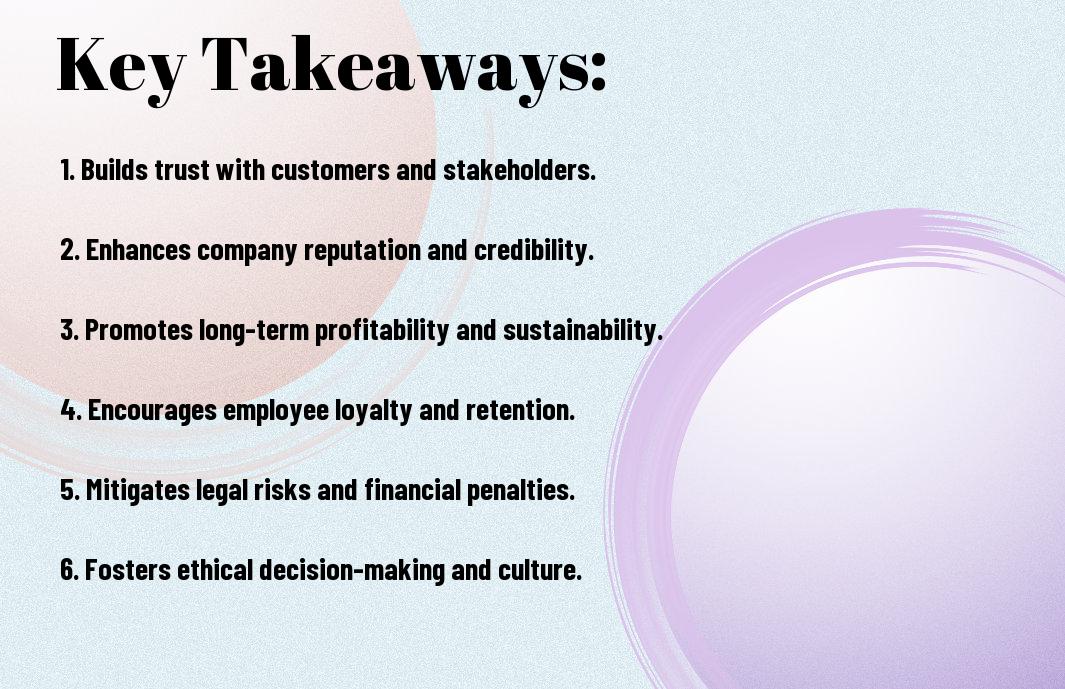Most successful businesses understand that integrity and ethical practices are key components of long-term achievement. By prioritizing business ethics, you not only foster a positive corporate culture but also build trust with employees, clients, and stakeholders. Your commitment to ethical behavior can enhance your brand reputation and drive customer loyalty, ultimately leading to better financial outcomes. As you navigate your business journey, recognizing the significance of ethics can set you apart in a competitive landscape, paving the way for sustainable growth and success.
Key Takeaways:
- Trustworthiness: Maintaining ethical practices builds trust among clients and stakeholders, leading to stronger relationships.
- Reputation: A commitment to ethical behavior enhances the business’s reputation, making it more attractive to customers and partners.
- Employee Morale: Ethical workplaces foster a positive culture, increasing employee satisfaction and retention rates.
- Legal Compliance: Adhering to ethical standards minimizes the risk of legal issues and financial penalties.
- Long-Term Success: Businesses with strong ethics are often more sustainable, leading to lasting growth and profitability.

Understanding Business Ethics
While navigating the modern business landscape, it is important to grasp the concept of business ethics. This framework encompasses the moral principles and values that guide your conduct within the professional realm. Business ethics is not just about adhering to laws; it reflects your commitment to fairness and integrity in your interactions with stakeholders, clients, and employees.
Definition of Business Ethics
At its core, business ethics refers to the application of ethical principles to business situations. It involves evaluating your actions and decision-making processes based on values such as honesty, transparency, and accountability. By embracing these principles, you can foster a responsible and trustworthy business environment.
Key Principles of Ethical Business Practices
Definition of key principles includes honesty, integrity, fairness, respect, and accountability. These principles serve as a foundation for your business ethics, guiding your behavior in decision-making and interactions. They ensure that you align your actions with your values and commitments, promoting a culture of transparency and trust.
Business ethics encompasses the behavior expected from you and your organization. Honesty requires you to provide truthful information, while integrity involves aligning your actions with your stated values. Fairness ensures equitable treatment of all stakeholders, and respect emphasizes recognizing the rights and dignity of others. Accountability fosters a culture where you take responsibility for your actions, encouraging ethical decision-making. By upholding these principles, you cultivate a positive business reputation and foster long-lasting relationships built on trust.
The Role of Business Ethics in Organizational Success
If you wish to cultivate a thriving business, understanding The Role of Ethical Decision-Making in Business Success is vital. Ethical practices not only guide decision-making but also foster a productive work environment that promotes collaboration and trust. When you integrate ethics into your organizational culture, you pave the way for enhanced performance and growth, ultimately leading to long-term success.
Building Trust with Stakeholders
To achieve sustainable success, you must build trust with your stakeholders, including employees, customers, and investors. Transparent communication and ethical actions demonstrate that you value their interests and foster a loyal relationship. When stakeholders trust your organization, you can effectively manage challenges and enhance overall operational effectiveness.
Enhancing Company Reputation
On the path to sustainable growth, enhancing your company’s reputation plays a significant role. Businesses recognized for their ethical standards attract a more favorable perception among consumers and investors alike. A strong reputation not only helps retain existing customers but also draws new ones, amplifying your market presence and profitability.
Hence, a positive reputation cultivated through ethical practices can lead to numerous opportunities. When your brand is associated with integrity and social responsibility, you differentiate yourself in a competitive market. This distinction can lead to stronger customer loyalty, higher employee morale, and more significant investment interest, all contributing to your organization’s enduring success. By prioritizing ethics, you are not merely protecting your company’s image; you are ensuring its future growth and sustainability.
Ethical Decision-Making Framework
Now, understanding an ethical decision-making framework is necessary for navigating complex business situations. This framework guides you through identifying ethical issues, considering stakeholders, and evaluating possible consequences of different actions. By following a structured approach, you can align your decisions with your values and the expectations of your organization, ultimately leading to ethical success in your business practices.
Evaluating Ethical Dilemmas
Below are steps for evaluating ethical dilemmas you may encounter. First, identify the stakeholders involved and the ethical principles at stake. Second, assess the potential impact of various actions on these stakeholders. Lastly, weigh your options against the ethical standards and values pertinent to your business, ensuring you make a well-informed decision.
Implementing Ethical Practices
Along with evaluating dilemmas, implementing ethical practices in your business fosters an environment of integrity and accountability. Establish clear policies that outline acceptable behaviors and decision-making processes aligned with your organization’s core values. Regular training and open discussions about ethical issues will also encourage transparency and promote a culture of ethics throughout your team.
For instance, consider creating an ethics committee that actively reviews and updates your policies based on real-world scenarios. This committee can facilitate workshops to educate your staff about ethical practices and provide a safe space for discussing dilemmas. Additionally, developing a system for reporting unethical behavior without fear of retaliation empowers your employees, reinforcing a culture where integrity is valued and upheld. By embedding these practices into your daily operations, you create a more ethical work environment that can contribute to your overall success.
Impact of Ethical Culture on Employee Morale
Many organizations with a strong ethical culture experience higher employee morale. When you foster a workplace that prioritizes integrity and fairness, you create an environment where employees feel valued and respected. This not only boosts their motivation but also encourages them to align their personal values with the company’s mission, which ultimately enhances productivity and commitment.
Employee Retention and Satisfaction
Below the surface, ethical practices significantly enhance employee retention and satisfaction. When you cultivate a transparent and fair work atmosphere, you reduce turnover rates, as employees are more likely to stay with a company that aligns with their values and provides a sense of belonging.
Fostering Team Collaboration
For a productive workplace, fostering team collaboration is crucial. When ethical standards are upheld, team members feel safe to express their ideas and concerns, leading to a stronger bond among coworkers and improved teamwork.
At the heart of effective collaboration is trust, which is developed through consistent ethical behavior. When you establish a culture where everyone’s voice is valued and respected, team members are more inclined to share their insights and work together to solve problems. This kind of environment not only fosters creativity and innovation but also enhances the overall performance of your team, making your business more resilient and adaptable to change.

Legal Implications of Business Ethics
Unlike individuals who may not face immediate consequences for unethical behavior, businesses operate in a framework of laws and regulations that enforce ethical standards. Engaging in ethical practices not only builds your company’s reputation but also safeguards you against legal trouble. To explore more about the significance of ethics in business, you can read this article on Why are ethics important in business?
Compliance with Laws and Regulations
With a strong foundation in business ethics, you ensure compliance with the myriad of laws and regulations governing your industry. This compliance helps to establish a stable operational environment, minimizing risks related to legal disputes and penalties.
Avoiding Legal Repercussions
An integral aspect of maintaining a successful business is avoiding legal repercussions that can arise from unethical conduct. By embedding ethical practices into your company culture, you significantly reduce the likelihood of facing lawsuits or regulatory actions that can damage your brand and financial stability.
Also, creating a robust compliance program not only shields you from legal repercussions but also fosters trust among your stakeholders. When your business operates ethically, you demonstrate to customers, employees, and partners that you value integrity, leading to stronger relationships and long-term success. These proactive measures position your business optimally in a competitive landscape, allowing you to thrive while maintaining ethical standards.
Case Studies: Successful Ethical Businesses
Once again, numerous businesses have demonstrated that ethical practices can lead to remarkable success. Here are some notable examples:
- Patagonia: Over 1 million customers have signed their “Don’t Buy This Jacket” campaign pledge, showing commitment to ethical consumption.
- Ben & Jerry’s: Known for their Fairtrade certified ingredients, they reported $235 million in sales in 2021, aligning profits with social responsibility.
- The Body Shop: With a mission for environmental and ethical practices, they surpassed $1 billion in annual sales.
- TOMS Shoes: Their One for One model has provided over 100 million shoes to children in need, helping to drive customer loyalty and growth.
For a deeper examine how these strategies support success, check out How Ethics in Business Drive Success | Seattle U Online.
Companies Leading by Example
Beside the examples listed, companies like Starbucks and Unilever continue to set high standards in ethical business practices. They prioritize sustainable sourcing and community engagement, enhancing brand loyalty while achieving impressive financial results.
Lessons Learned from Ethical Failures
With the history of corporate scandals, companies have learned the hard way that neglecting ethical considerations can lead to failure. High-profile cases, such as Enron and Volkswagen, illustrate the severe repercussions of unethical behavior, emphasizing the importance of integrity in business dealings.
Lessons from these failures highlight the necessity of transparency and accountability. They show you that ethical lapses can damage reputations, lead to legal troubles, and ultimately result in financial losses. Establishing robust ethical guidelines and fostering a culture of integrity can help you avoid the pitfalls seen in these infamous cases.
Summing up
With this in mind, understanding the significance of business ethics is imperative for your success. Ethical practices not only strengthen your reputation but also foster trust among clients, employees, and stakeholders. By prioritizing integrity in your decision-making, you can promote a positive workplace culture, drive loyalty, and establish long-term relationships that enhance your overall business performance. Staying committed to ethical principles can differentiate you in a competitive market and ultimately lead to sustainable growth and achievement.
FAQ
Q: What role do business ethics play in building a trustworthy brand?
A: Business ethics are necessary for cultivating a trustworthy brand image. When a company adheres to ethical standards, it demonstrates commitment to integrity and transparency, which resonates with customers and stakeholders. This trust leads to customer loyalty and positive word-of-mouth referrals, ultimately contributing to sustained business success. Companies with a strong ethical foundation often find themselves more resilient in times of crisis, as stakeholders are more likely to stand by a brand they trust.
Q: How can ethical practices improve employee morale and retention?
A: Ethical practices create a positive workplace culture that values fairness, respect, and transparency. When employees perceive their organization as ethical, they are more likely to feel valued and engaged in their work. This high level of engagement not only enhances overall job satisfaction but also reduces turnover rates, as employees prefer to stay with companies that align with their personal values. Additionally, ethical companies often attract top talent who are seeking a work environment that prioritizes ethical conduct.
Q: In what ways do business ethics impact customer relationships?
A: Business ethics significantly influence the dynamics between companies and their customers. Ethical practices promote open communication, fair treatment, and respect for customer rights, which fosters positive relationships. When customers recognize that a company prioritizes ethical behavior, they are more likely to develop loyalty to the brand and choose its products or services over competitors. Moreover, ethical businesses are often viewed as more reliable and responsible, enhancing their reputation and long-term success in the market.

